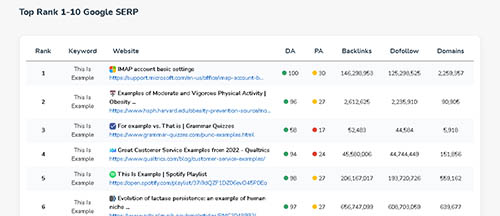Analyze Your Competitors in Search Engines
Competitors are commonplace in business, all businesses must have competitors whether in everyday life or in the digital world. With competitors, you can be motivated to move forward in developing your business, designing and determining strategies to compete with your competitors. In the digital world or websites, in developing a website, we really need to think deeply to be able to compete with other competitors in search engine rankings. Many factors influence your website to enter the main page of search engines including keywords, backlinks, authority (Domain Authority and Page Authority), quality content, targeted content and much more.
When you are struggling to optimize your website's SEO both On-page and Off-page, it would be nice to research and analyze the niche and keywords of your website in a targeted manner by doing keyword analysis with Genelify SEO & SERP Keyword Competition Analysis tool, why? when you have determined what keywords to develop, you need to see what happens if these keywords are submitted to the Google Search field, this SEO & SERP Keyword Competition Analysis tool can detect how many backlinks they already have, what is the score from Domain Authority and Page Authority, so you will get an idea of what you should do next, whether prioritizing backlinks or domain authority and others.

What Benefits of Using the SERP Keyword Competition Analysis Tool
You will get information on your competitors for free, we will analyze the top 20 Google pages based on the keywords you input and will generate several important indicators that you can use to research keywords from your competitors, such as Title, Domain Authority (DA), Page Authority (PA), the total number of backlinks and much more. You can also enter your Domain URL to detect whether your website has entered the top 20 Google pages, if detected, our system will notify you.
Before determining the keywords to target, it is important to evaluate the market competition, especially in the search engine SERPs, you can see how your competitors are using keywords to get the top 20 ranking results in the Google Search. Our tool will detect the top 10 in Google Search Results related to the keywords you entered, for example, if you have finished writing an article about how to make cakes, you can see if these keywords appear in the SERPs of your website.
We also analyze each domain in the top 10 SERPs, namely by looking at how many backlinks they have, what the value of Domain Authority and Page Authority are and many more, some of these elements you can use to analyze your domain and optimize SEO on your site.
What Is SEO Keyword Competition Analysis?
Basically, competition between keywords is a way to identify how difficult it is to rank. Keywords may vary depending on how popular they are. This tool can help you to measure how much time it takes for a keyword to reach its highest point.
Website owners are usually worried about this, because they are thinking about whether they have chosen the right keywords, but with our SEO Keyword Competition Analysis tool. This tool is a great way to evaluate your work because our system analyzes how the highest ranking websites perform. Even though you have evaluated the content and content of your website, you need to wait for time whether the improvements you have made are correct or not, namely by re-checking your keywords and site in our SEO Keyword Competition Analysis tool.
Some tips you can use to evaluate your content include:
Pay attention to the number of keywords you use, whether too often or not enough, because by using keywords too often search engine bots will consider spam in your content, and you should avoid it, use our Keyword Density checker tool to analyze the number of keywords used.